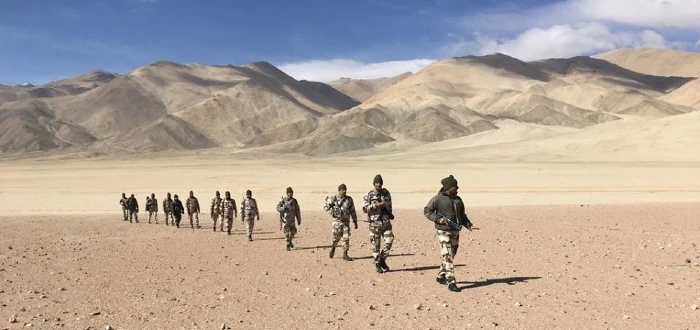

China wants to prevent the rise of India as a competitor by keeping the borders on the boil so that precious resources are diverted from the economy on account of excessive military expenditure
<p>
<strong>Earlier this week, China has blamed India for pursuing a &ldquo;forward policy&rdquo; along the border. It has also accused New Delhi of beefing up its artillery punch along the Line of Actual Control (LAC), which marks the de facto, but disputed boundary between the two countries.</strong></p>
<p>
By pinning blame on an &ldquo;aggressive&rdquo; India, Chinese mandarins are trying to obfuscate the ground reality. It is China and not India that initiated the change in status quo along the borders.</p>
<p>
Egged on by &ldquo;iron brother&rdquo; Pakistan, the Chinese are peddling the myth that abrogation of 370 by India on August 5, 2019, was the starting point of India&rsquo;s forward policy, of reclaiming territories&mdash;Gilgit Baltistan in Pakistan occupied Kashmir, Aksai Chin in Tibet and the Shaksgam valley, a strip of territory in POK that Pakistan had ceded to China in 1963.</p>
<p>
In fact, to address Chinese concerns about the intent of the August 5 decision, which included formation of Ladakh as centrally administered Union Territory, External Affairs Minister S, Jaishankar visited Beijing in early August 2019. The purpose of his visit was two-fold. First, it was to convey to China that the legislative changes that India had made, would not in any way change the status quo along the borders. Second, Jaishankar&rsquo;s visit was meant to define a blue-print for stepping up people-to-people exchanges between the two countries.</p>
<p>
Consequently, on August 12, 2019 Jaishankar told a press conference in Beijing that he had conveyed to the Chinese that, &ldquo;The legislative measures were aimed at better governance and socio-economic development.&rdquo;</p>
<p>
He added: &ldquo;There was no implication for the external boundaries of India or the Line of Actual Control with China. India was not raising any additional territorial claims. The Chinese concerns in this regard were misplaced.&rdquo;</p>
<p>
But, as it was proven later, the Chinese did not take seriously, Jaishankar&#39;s assurances which reflected the thinking in New Delhi at the highest level.</p>
<p>
The Chinese also disregarded Prime Minister Narendra Modi&rsquo;s intent to take the India-China relations rapidly forward, during the October 2019, Chennai informal summit.</p>
<p>
But in yet another demonstration of treachery, in May 2020, Chinese troops brazenly changed the status quo along the LAC by occupying critical heights along Pangong lake, Ghogra, Hot Springs and the Depsang plains. The Chinese cited as hostile India&#39;s construction of the DSDBO road linking Leh, the capital of Ladakh, with Daulat Beg Oldi, a settlement on the base of the legendary Karakorum pass.</p>
<p>
<img alt="China India" src="https://www.indianarrative.com/upload/news/a5dd4b72e513160b7a51e66ad0814089.webp" style="width: 100%; height: 100%;" /></p>
<p>
Why did China make its unilateral move, disregarding Indian assurances, at the highest level about the benign intent of the abrogation of article 370 and bifurcation of the state of Jammu and Kashmir?</p>
<p>
It is now apparent that taking advantage of India&rsquo;s decision, China went into an aggressive mode, in a bid to fulfill the Maoist fantasy of defining the India-China border along the 1959 claim line. In a statement to <em>Hindustan Times</em>, Chinese foreign ministry spokesperson, asserted that Beijing abides by the LAC proposed by premier Zhou Enlai to prime minister Jawaharlal Nehru in a letter dated November 7, 1959.</p>
<p>
Apart from India-claimed Aksai Chin, the 1959 line shows the boundary aligned south-east from the Karakoram Pass to the Changchenmo River Valley, as <a href="https://theprint.in/theprint-essential/whats-the-1959-claim-line-the-one-china-says-its-following-in-the-ladakh-stand-off/513878/">stated</a> by Sinologist Neville Maxwell.</p>
<p>
&ldquo;In Indian perception, Zhou&rsquo;s proposal would leave the Chinese deep inside Indian territory in the western sector, while Indian troops would have to withdraw further into India, say C.V. Ranganathan and Vinod C. Khanna in their book India and China &mdash; The Way Ahead.</p>
<p>
China&rsquo;s covetous and overbearing disposition is driven by two major factors. First, China sees India as a major obstacle to Beijing&rsquo;s return to becoming the Middle Kingdom&mdash;a historic self-perception since the Zhou dynasty that China is the centre of the world surrounded by servile tributary states. Chinese President Xi Jinping has recast this aspiration by saying that Beijing was seeking the fulfilment of the &ldquo;Chinese dream&rdquo;. The Chinese dream would be fulfilled by 2050, when China achieves its second &ldquo;centenary goal&rdquo; of emerging as the most powerful country in both the hard power and soft-power domains.</p>
<p>
Second, China wants to prevent the rise of India as a competitor by keeping the borders on the boil so that precious resources are diverted from the economy on account of excessive military expenditure.</p>
<p>
Unsurprisingly India has rubbished the Chinese accusations that New Delhi was pursuing a &ldquo;forward policy&rdquo; and spawning a regional arms race.</p>
<p>
On the contrary, India on Thursday said that the Chinese military&rsquo;s &ldquo;provocative behaviour&rdquo; and &ldquo;unilateral attempts&rdquo; to change the status quo along the Line of Actual control in Ladakh has disturbed peace in the region.</p>
<p>
Spokesman of the Ministry of External Affairs, Arindam Bagchi, said it was China that continues to deploy a large number of troops along the border areas. He stressed that the Indian Army made similar deployments only in response to China&rsquo;s actions.</p>
<p>
<strong>Also Read: <a href="https://www.indianarrative.com/latest-news/india-snaps-back-at-china-for-accusation-over-galwan-valley-clashes-116997.html">India snaps back at China for accusation over Galwan Valley clashes</a></strong></p>
Union Minister Hardeep Puri on Tuesday highlighted Central Government's series of sweeping policy reforms under…
The World Food Programme (WFP) has once again raised alarm over the worsening humanitarian crisis…
The Tibetan and Korean Buddhist communities in Busan came together to celebrate the 90th birthday…
Taiwan plans to ask its diplomatic partners and friendly nations to bring up China's unilateral…
Google has rolled out AI Mode feature for all users in India, which will make…
71-year-old physician and veteran lawmaker Jennifer Geerlings-Simons has been elected as Suriname's first female president,…